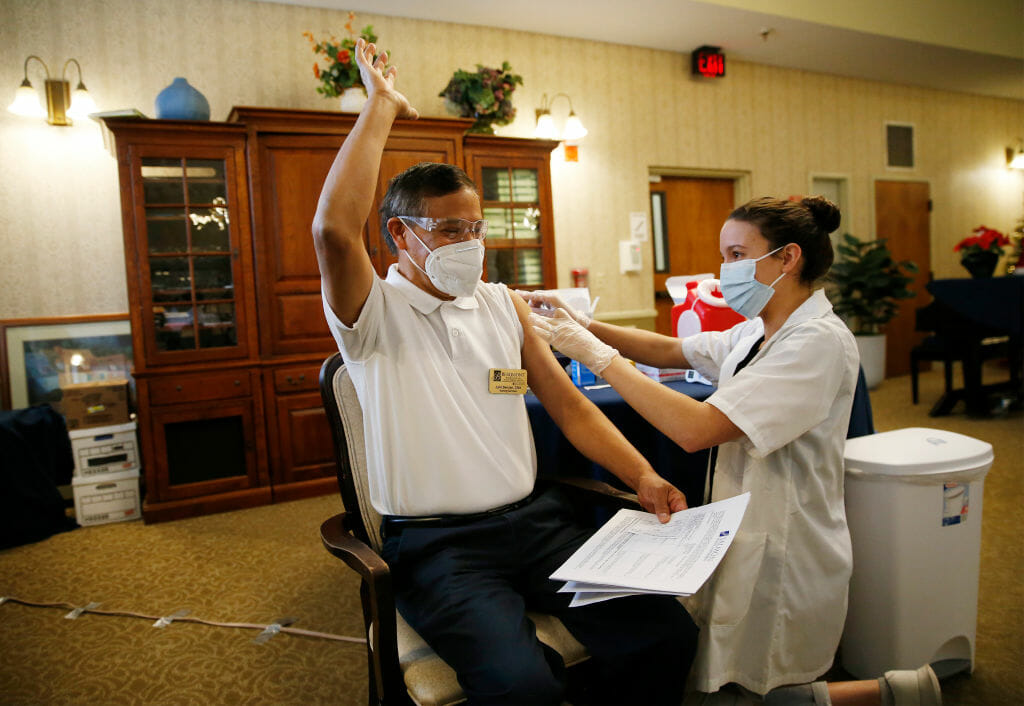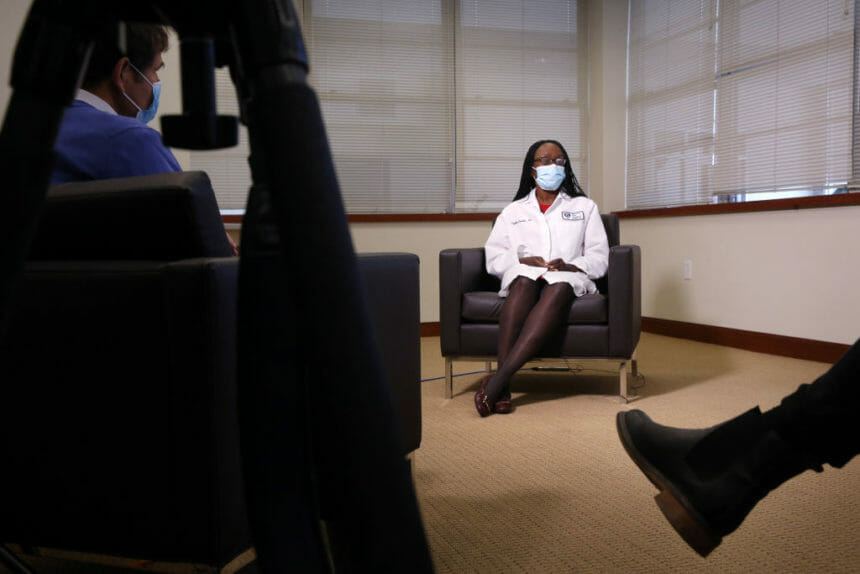There’s absolutely nothing sluggish about this virus, surging worldwide in a January that promises an ongoing litany of grim news and numbers. As a spokesperson for the World Health Organization advised, “The more you can bring the transmission down, the better chance you have of your vaccination strategy working.”
That’s why the next six months will be critical to breaking the back—and the infectious spirit—of this virus, which has claimed more than 360,000 lives in the US and more than 1.8 million worldwide. In December, the last continent left untouched by the pandemic, Antarctica, reported an outbreak of SARS-CoV-2 infection among members of a Chilean research outpost, adding 36 cases to a worldwide total that now stands at more than 87 million. An astonishing 21 million of them are in the US.
Of course, until access to the new vaccines reaches far and wide and deep, we need to persevere and make public health mantras a New Year’s resolution. Once again: Wear a mask, wash your hands, practice social distancing and avoid large gatherings. It’s not a lot to ask.
This week’s Haymarket Media Coronavirus Briefing is 1,584 words and will take you seven minutes to read.
The messaging
Voices matter. Influencers influence.
- Eighteen leading health organizations and Dr. Anthony Fauci are partnering with the Ad Council and the Covid Collaborative on a video series to help healthcare providers respond to common questions about COVID-19 vaccine and “to help inspire better understanding and confidence.” It’s the start of a broad-based, multilevel, yearlong educational campaign.
- Leaders of the US Conference of Catholic Bishops have stated that the mRNA COVID-19 vaccines (Pfizer/BioNTech and Moderna) are acceptable despite a “remote connection” to cell lines obtained from aborted fetal tissue. “Receiving one of the COVID-19 vaccines,” they said, “ought to be understood as an act of charity toward the other members of our community. In this way, being vaccinated safely against COVID-19 should be considered an act of love of our neighbor and part of our moral responsibility for the common good.”
- The Orthodox Union and Rabbinical Council of America, citing “the Torah obligation to preserve our lives and the lives of others,” said “we strongly encourage all those eligible to access the COVID-19 vaccination to do so. We hope and pray that such steps will help bring to an end the tragic toll that the pandemic has taken on our community and beyond.”
- The National Muslim Task Force on COVID-19 and the National Black Muslim COVID Coalition have jointly recommended receiving the mRNA vaccines “as directed by your physician or healthcare provider based on your risk and local public health authority guidance.” They added: “We understand that some communities distrust the system and have legitimate concerns over vaccines and vaccination protocols. So we recommend healthcare providers engage with minority communities – racial, religious, and otherwise – to address these concerns as the pandemic rages on.”
- The National Medical Association, an organization of Black physicians, supports the emergency use authorizations granted to the Pfizer/BioNTech and Moderna vaccines, adding that “Building equity in plans to distribute the vaccines including culturally sensitive, multilingual outreach tailored for local communities will be essential for closing gaps in health outcomes.”
- The website of the Centers for Disease Control and Prevention now has a landing page for patients on COVID-19 vaccines, including a helpful primer on 8 Things to Know About the U.S. COVID-19 Vaccination Program. The CDC will be unveiling a broader media campaign this month.
- The CDC has also created a new, online learning module for healthcare providers who are administering COVID-19 vaccine, as well as guidance specific to the Pfizer/BioNTech and Moderna vaccines.
- In Medical Bag, Lina Zeldovich offers physicians a nifty COVID-19 Vaccine Cheat Sheet.
- The American College of Obstetricians and Gynecologists (ACOG) has issued a Practice Advisory on COVID-19 vaccination for pregnant and lactating women. Although those groups were not included in clinical trials, ACOG says that they should have the opportunity to be vaccinated at the same time as other members of their priority group.
- The CDC and American College of Allergy, Asthma, and Immunology have provided guidance on anticipating and managing the risk of allergic reactions to COVID-19 vaccine.
The takeaway:
We’ve got a developing information gap: a country with not one vaccine distribution plan but a patchwork crazy quilt of dozens. Officials admit there will be some “confusion and inefficiency” and “a very complicated triage process” as millions wait their turn.

The pushback
We continue to battle the relentless surge of infection and, at least based on the most recent numbers, we’re down on most judges’ scorecards. But there are many rounds left in the fight.
- Nursing home operators are working hard to increase their employees’ comfort level with vaccination, Lois A. Bowers reports in McKnight’s Senior Living. Strategies include giving employees an opportunity to ask questions and learn about the vaccine; creating a culture of vaccine acceptance; and encouraging discussions with primary care physicians.
- Medical Bag’s Katie Kosco surveys physicians’ top lessons learned during 2020–learning to work in teams with colleagues across disciplines, respond to spiking levels of fear and anxiety among their patients, and deal with rampant misinformation about the pandemic.
- The UK is now in lockdown mode as a variant form of the virus, also now reported in the US, continues its spread. The government expects to vaccinate up to two million people a week, now that it has approved the AstraZeneca/Oxford vaccine as well as the Pfizer/BioNTech one.
- Ursula von der Leyen, President of the European Commission, has taken to YouTube to emphasize the importance of a coordinated approach, recognizing that getting 27 countries to move as one is a “herding cats” version of public health policy.
- Meanwhile, myths persist, among them the notion that young people don’t get COVID, or COVID that is worth worrying about. While the vast majority of deaths occur in older adults, nearly 22,000 people in the US ages 25 to 54 have died of this disease—and millions of younger adults with mild and manageable COVID-19 can transmit it to others more vulnerable.
- The Intellus Health Literacy Initiative has developed posters in 27 languages reminding people to cover their nose and mouth with a mask.
- Operation Warp Speed took a page from the polio vaccine playbook of the 1950s, encouraging pharma companies to begin manufacturing vaccine while clinical trials were still under way. In Politico, Joanne Kenen notes that the National Foundation for Infantile Paralysis “ordered big batches of the vaccine, willing to discard it if it failed but eager to start injecting kids as soon as possible if the clinical trials worked… The early purchases helped to mitigate the huge financial risk of bringing an uncertain product to market.”
- FYI, here’s the CDC’s list of medical conditions that increase the risk of severe COVID-19, from cancer and chronic kidney disease to obesity, sickle cell disease, and type 2 diabetes. In Hematology Advisor, Lauren Dembeck explains how the combination of sickle cell disease and COVID-19 heightens the risk of hospitalization and death.
- And here’s a symbolic milestone: On December 28, COVID-19 vaccine arrived at the doorstep of the Life Care Center in Kirkland, Washington, where the first outbreak in the US and the first officially reported death occurred 10 months earlier (total of 129 cases, 23 deaths).
The takeaway: More vaccines–and more doses–are on the way. Hang on and pay attention to news and alerts from your local and state health departments..
The rest
- In 1956, 21-year-old Elvis Presley received the polio vaccine backstage at the Ed Sullivan Show to help calm public qualms about vaccine safety. The King also recorded a public service announcement for kids and teens. Suggestions for a 2021 Corona-Elvis include Beyoncé, Tom Hanks, Oprah Winfrey, The Rock, LeBron James and Dolly Parton.
- You want an influencer? Why not 34-year-old Dr. Kizzmekia Corbett, lead scientist at the National Institutes of Health for coronavirus vaccine research, who worked with Moderna on its mRNA technology and gave a talk about vaccines in an MIT pandemic lecture series. Or Dr. Ala Stanford, head of the Black Doctors COVID-19 Consortium in Philadelphia.
- Vaccinate Your Family (formerly Every Child by Two) reminds parents that children should have their routine immunizations during the pandemic and that any vaccination visits that had been cancelled should be rescheduled.
- An employee at a San Jose hospital walked into the emergency department on Christmas Day wearing an inflatable, fan-powered Christmas tree costume in an effort to spread good cheer. What may have been spread were coronavirus particles: 44 employees have been infected and one has died.
Stuff you can do
- Celebrate Beethoven’s 250th (birthday) by listening to Beethoven’s 5th (symphony).
- Check out a couple of outstanding overviews of what just happened and what happens next by Ed Yong in The Atlantic (Where Year Two of the Pandemic Will Take Us) and Lawrence Wright in the New Yorker (The Plague Year).
- Take a virtual tour of the Art of Quarantine, classics reimagined for a pandemic era. What if hand sanitizer had been available in Michelangelo’s time, or if Magritte had been passionate about face masks as well as bowler hats?
That’s it for today. Be sure to check out the Haymarket Media Vaccine Project Newsletter, set to be published every Wednesday, and come back next Thursday for your weekly Coronavirus Briefing fix. Hoping you and yours remain safe and well amid the continued craziness. A better, brighter day is coming.







